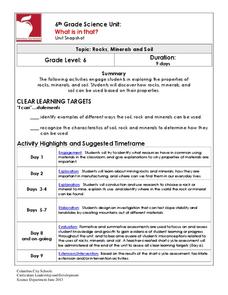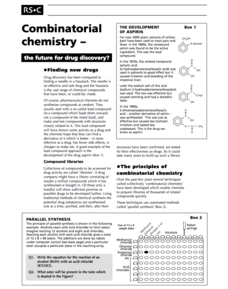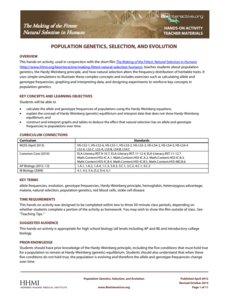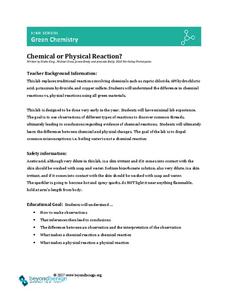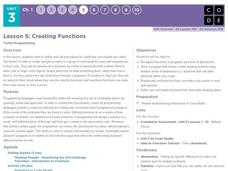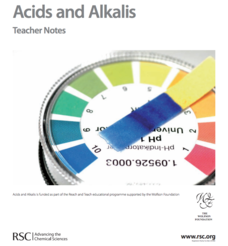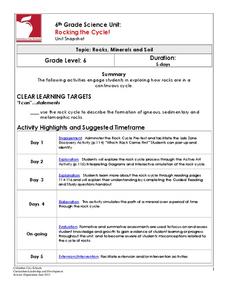Columbus City Schools
What is in that?
Invite your class to dig in to an engaging journey into the world of mining! Here you'll find the tools to equip young miners with knowledge of soil, rocks, and minerals, as well as types of mining operations. To round things out, the...
Curated OER
Space Science: Phases of the Moon
Looking for a terrific lesson on the phases of the moon that has lots of good worksheets? With two excellent websites are embedded in the plan, the activity is sure to spark some interest in your astronomy unit. Some common...
Columbus City Schools
To Measure its Mass or Volume?
Atoms, elements, and molecules, oh my! Teaching the fundamentals of chemistry to curious sixth graders has never been easier to accomplish. Here is a resource that pulls together everything needed to get them off to a good start,...
Virginia Department of Education
Predator-Prey Simulation
Do your pupils have the misconception that environmental predators are "bad" and harm smaller creatures? The simulation explains, in detail, the important role predators play in maintaining a stable ecosystem. Through web-based research,...
Columbus City Schools
Sedimentary Rocks
Turn your class discussion of rock formation from ho-hum to holy hornfels! Junior geologists gain experience in identifying rock types and rock origins, with an emphasis in hypothesizing the environment needed to form certain rocks. The...
Discover Earth
Weather Stations
Transform your classroom into a fully functioning weather station with this series of hands-on investigations. Covering the topics of temperature, precipitation, wind patterns, and cloud formation, these activities engage young...
Discovery Education
The Science of Addiction: The Story of Teens
Users of Discovery Education's interactive on the biology of addiction examine common misconceptions about opioids and learn about the factors that cause addiction. Additionally, they listen to the stories of three teens and their...
Chicago Botanic Garden
Greenhouse Gas Emissions – Natural and Human Causes
Part three in the series of seven has pupils discussing the different greenhouses gases, learning about the carbon cycle, and then watching a short video about the carbon cycle. Based on their knowledge, individuals complete a greenhouse...
Science 4 Inquiry
Body in Balance
The human body maintains homeostasis through the interconnection of multiple systems. Young scientists match these connections and discuss how they relate to each other. They apply their knowledge to solve the mystery of a treasure hunter.
Flipping Physics
AP Physics 1: Electrostatics Review
AP Physics scholars will be excited to find this review of electrostatics as they prepare for the AP exam. Fast-paced, interesting, and comprehensive, the video also includes test-taking tips and common misconceptions.
Royal Society of Chemistry
Combinatorial Chemistry—Chemistry Now
Finding new drugs has been likened to finding a needle in a haystack. How do pharmaceutical companies do it? One of a small series of four informative leaflets examines combinatorial chemistry, the method at the forefront of new drug...
Columbus City Schools
Transformation: Energy in Disguise
Energy transformations happen everywhere, every second of the day. The energy transformation common to most scholars is potential and kinetic energy. The three-week lesson covers multiple types of energy transformations through...
Howard Hughes Medical Institute
Population Genetics, Selection, and Evolution
The Hardy-Weinberg principle states that alleles and genotypes remain constant in the absence of evolutionary influences. Scholars complete a simple hands-on activity applying the Hardy-Weinberg principle to sample data. They observe how...
Beyond Benign
Chemical or Physical Reaction?
Ready to take your chemistry class on its first big lab adventure? Dive in to differentiation between chemical and physical changes with a thoughtfully designed set of experiments! Partners conduct a series of reactions, describe their...
Concord Consortium
Boiling Point
Is it getting hot in here? Observe boiling from inside a beaker in an engaging interactive. Chemistry scholars heat and cool polar and non-polar solids and observe how molecules react to temperature changes. Your class' misconceptions...
Code.org
Creating Functions
Quit repeating yourself ... you can make this simpler! Rather than repeating the same set of code over and over, class members learn to build and call functions in a series of challenges in App Lab. In the end, they combine functions to...
EngageNY
Science Talk: How do Bullfrogs Survive
Following the reading of the book Bullfrog at Magnolia Circle, the ninth lesson in this unit involves emerging experts in a science talk about how bullfrogs survive. Looking back through the text, young scholars prepare for the...
California Academy of Science
Kinesthetic Astronomy: Moon Phases
We are the world! Each of your class members models Earth and holds a styrofoam ball to see its phases. Thorough teacher background information and a detailed lesson plan will make this a cinch to teach. If you do not want to purchase...
PHET
Planetary Magnetism
What do magnetic fields look like? The best way to learn about magnetic fields is to try identifying them for yourself. Scholars will understand the importance of magnetic fields after completing this experiment. The extension activities...
Royal Society of Chemistry
Acids and Alkalis—Gifted and Talented Chemistry
Looking for a comprehensive plan for teaching acid-base chemistry? Science scholars discover acid-base interactions through a thoughtfully written unit. The resource is divided into paced activities and individual work designed to...
California Academy of Science
Kinesthetic Astronomy: Earth's Rotation
After completing the activity, "Kinesthetic Astronomy: The Meaning of a Year," zoom in on Earth's rotation using the same simulation setup and this outline. Each class member dons a map of the Western Hemisphere and plays the part of...
Columbus City Schools
Rocking the Cycle!
Time to rock out! Discover the "life" cycle of the average rock using an illustrative stations lab and stimulating pairs game. Roll the dice to determine your fate: will it be melting in magma or chilling out to form igneous rock? The...
Royal Society of Chemistry
Equilibria—Gifted and Talented Chemistry
Teaching is a balancing act! Keep things on an even keel with a comprehensive equilibrium lesson plan. The resource covers reversible and irreversible reactions, Le Chatelier's Principle, and the industrial applications of equilibrium...
Curated OER
Energy Misconceptions
The plan is that future physicists take an "Energy Misconceptions" quiz before completing a series of activities that are focused on energy concepts. The activities, however, are not outlined in this resource; only the quiz and detailed...


